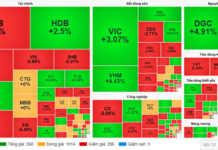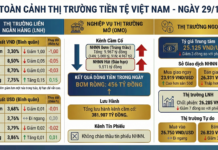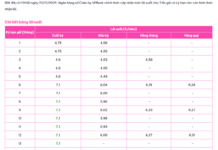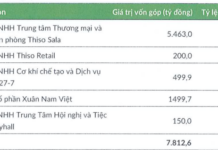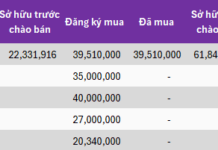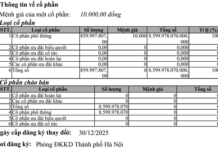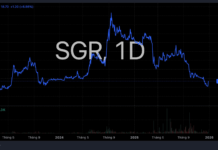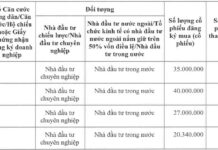The Stock Market in Vietnam Experiences Its Worst Trading Session in Nearly 2 Years

The Vietnamese stock market suffered its worst trading session in nearly two years on April 15th, 2023. (Photo: CTV)
The Vietnamese stock market witnessed a significant downturn on April 15th, 2023, experiencing its worst trading session in almost two years. The VN-Index plunged nearly 60 points, with a staggering 111 stocks on the HoSE exchange hitting their lower trading limits.
Chaos ensued among investors on the trading floor. Tuan, a seasoned investor with SSI, shared his dismay: “My entire portfolio, which was on the cusp of profitability, took a sudden nosedive. Stocks that were projected to reach profit targets today are now deep in the red. After just two trading sessions, my losses have reached 10%, forcing me to consider cutting my losses.”
The turbulence extended beyond Monday evening into Tuesday morning, as hundreds of online forums buzzed with discussions centered around the perplexing question: “What triggered this dramatic market plunge?” A renowned economist exclaimed on his personal page: “It’s unbelievable that $10 billion in market capitalization has vanished.”
Analysts from brokerage firms and industry experts promptly launched investigations to dissect the causes.
According to their findings, the exchange rate emerged as a significant culprit, sparking concerns among market participants, including mutual funds and foreign investors. On April 16th, the State Bank of Vietnam set the central exchange rate at 24,141 VND/USD. However, the USD price at commercial banks surged relentlessly, reaching its highest mark in history since 2000, exceeding 25,300 VND/USD. Apprehension among foreign funds led to a wave of selling.
Data from VPB Securities (VPBankS) suggests that exchange rate fluctuations beyond 3% tend to have an adverse impact on the stock market, potentially triggering net selling by investors. Tran Hoang Son, Chief Market Strategist at VPBankS, noted that during a period of significant exchange rate appreciation in 2022, the stock market witnessed substantial selling by both domestic and foreign investors. In the latter half of 2023, when the exchange rate rose again, foreign entities engaged in sustained net selling.
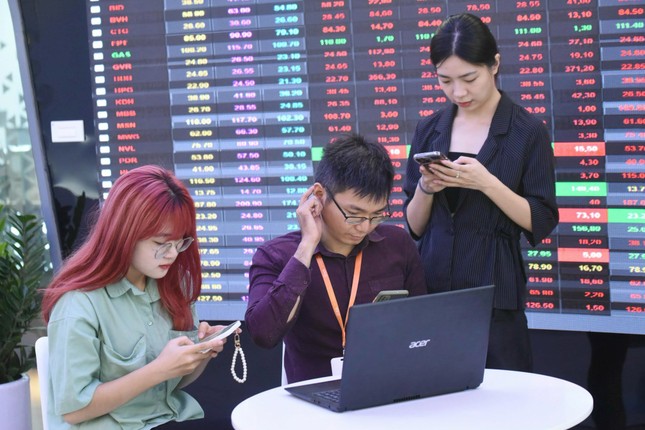
The market plunge on April 15th erased $10 billion in market capitalization. (Photo: Như Ý)
In addition to the exchange rate impact, the conflict between Israel and Iran, with its potential implications for financial markets, also played a role in investor anxiety. Son opined that the immediate concern stemming from the conflict was its inflationary impact, while the effects on asset markets typically manifest less prominently within the first two weeks. Paradoxically, he suggested that the situation could present buying opportunities for investors.
Beyond macroeconomic factors, the most immediate catalyst for the market’s second “dark” day was attributed to the spread of unfounded rumors (related to legal matters). Personal finance expert Le Xuan Huy observed that after the turbulent events of 2022-2023, during which many rumors proved accurate, investors had become highly sensitive to such speculation. Capitalizing on this heightened sensitivity, certain individuals and groups deliberately disseminated rumors to manipulate the market.
“Following a tumultuous period in the market from 2022-2023, during which numerous rumors emerged and were later confirmed, investors have become increasingly susceptible to such speculation. Exploiting this heightened sensitivity, individuals and groups have intentionally spread rumors to manipulate the market for their own purposes.”
Personal Finance Expert Le Xuan Huy
Challenges
The market’s woes continued on April 16th, with the VN-Index briefly falling below the 1,200 point mark. However, a positive response emerged later in the session, as bargain hunters stepped in, driving a strong recovery in the index. While losses outnumbered gains by a ratio of 2.5 to 1, the gap narrowed as the VN-Index closed near the 1,215 point reference level. Domestic inflows provided support, while foreign trading activity also turned positive, with net buying reaching 114 billion VND.
Among the few gainers in the securities sector on April 16th was SSI, which rose a modest 0.7% after issuing a clarification regarding a media mix-up involving an image of its Chairman, Nguyen Duy Hung, with that of the arrested Chairman of Thuan An Group. SSI urged relevant authorities to intervene promptly and provide accurate information to dispel public confusion, safeguard market stability, and protect the legitimate interests of investors.
According to Dinh Quang Hinh, an expert at VNDirect Securities, the higher-than-expected inflation rate in the U.S. in March has fueled market concerns that the Federal Reserve (Fed) may prolong its elevated interest rate policy. Currently, market forecasts indicate that the earliest potential interest rate cut by the Fed has been pushed back to Q3, instead of the previously anticipated June timeframe. Additionally, expectations for the number of Fed rate cuts in 2024 have been revised down to 1-2 from the earlier projection of 3. It is worth noting that the likelihood of major central banks, such as the ECB, cutting interest rates ahead of the Fed is increasing. This could result in the U.S. Dollar Index (DXY) maintaining its strength in the coming months, thereby continuing to exert pressure on Vietnam’s exchange rate.


